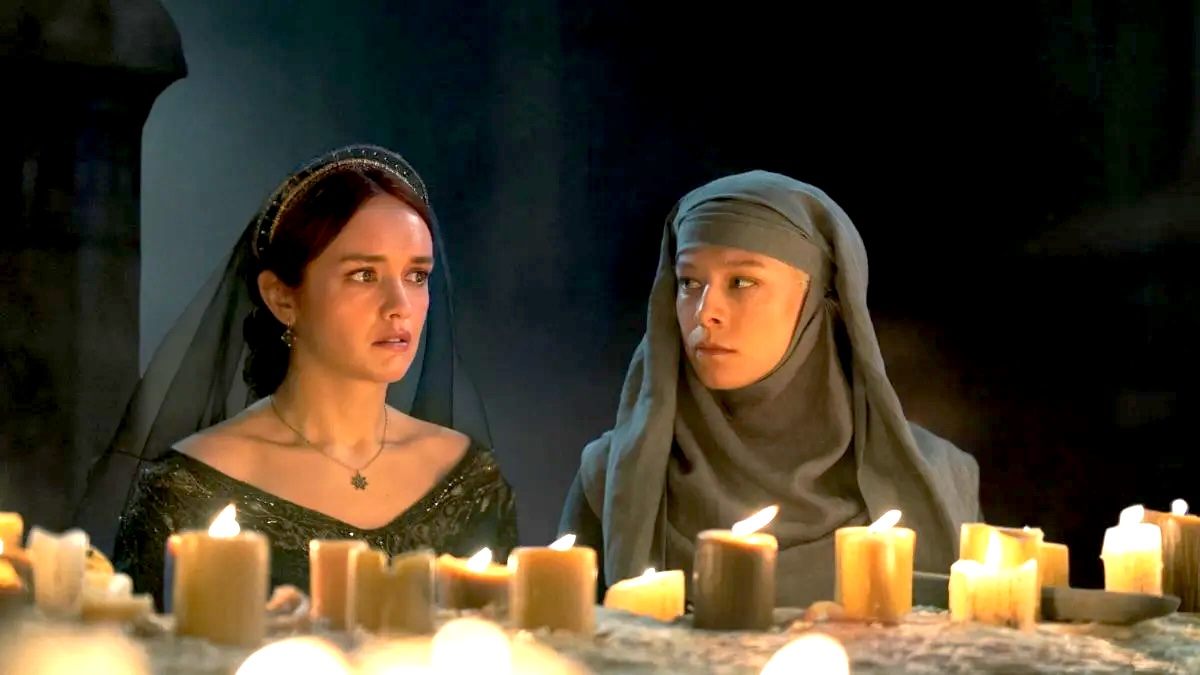The Queer Subtext in ‘House of the Dragon’ Is Not Even Subtext Anymore
That is very much text.

The final scene of House of the Dragon season 2, episode 3, “The Burning Mill,” was honestly something that I didn’t think we would have ever seen—even with the fandom speculating about it back when the first trailers for this new season dropped.
Spoilers ahead for everything that happened during House of the Dragon season 2, episode 3, “The Burning Mill.” Be warned.
And instead, here we are, with Rhaenyra making one last bid for peace by sneaking into King’s Landing and trying to reason with Alicent.
I think I had an out-of-body experience for the entire length of the scene, from when Rhaenyra makes her way through King’s Landing’s roads disguised as a septa to Alicent’s shock when she realizes she’s actually there, to—of course—their incredibly important dialogue as they both kneel in the middle of the sept.
Extradiegetically, it makes a lot of sense for the House of the Dragon showrunners to bring two of their most talented actors together, especially considering their incredible chemistry. But then there’s the fact that it’s also such an understandable action for how Rhaenyra and Alicent were written.
The fandom has been arguing about it non-stop ever since the episode aired, but in my opinion, it fits in perfectly with everything else.
Rhaenyra and Alicent are the heart of the show
Rhaenyra and Alicent are undoubtedly the beating, emotional heart of the show, and they have been since the decision was made to age Rhaenyra up so that she and Alicent could be childhood companions—and a right decision at that, because it adds so much emotional complexity to what would have instead been a story about women constantly in competition and jealous of one another.
Their relationship, the way it bloomed and then soured and now clearly lies heavy on both of them, shapes every single decision that they make. Of course, people who aren’t willing to admit Rhaenyra and Alicent love each other—it doesn’t matter whether it’s romantically or platonically, more on that later—can’t understand why Alicent is constantly writing to Rhaenyra or why Rhaenyra would objectively risk it all to meet Alicent face to face.
You have to factor in their feelings other than just the plain, hard logic of their roles—and their feelings have always been of care towards each other deep down, even when anger and resentment were boiling on the surface.
Queer or not queer?
Now, I personally think that the queer subtext of this show stopped being subtext and became text the second young Rhaenyra sighed after Alicent when she offered to fly on Syrax together back in season one. And then that text is highlighted in that Small Council scene when Rhaenyra is staring at Alicent so much that she’s practically burning a hole in her forehead while Alicent is visibly shaken by it.
The scene in the sept undeniably has a tension coursing through it that borders on the erotic, together with the obvious sense of danger should Rhaenyra be discovered. All of the unnecessary sex scenes between Alicent and Criston Cole couldn’t scrape together an ounce of the same feeling that dominates this scene, with them falling back into the banter of their childhood, their proximity, and the way in which Alicent holds Rhaenyra’s armed hand.
And then there’s the viciousness—the way Alicent hits Rhaenyra with that oath on her mother, calling back to the same oath Rhaenyra had made to her back in season one, once Rhaenyra implies that maybe she no longer knows Alicent as well as she used to do. But being known by Rhaenyra is such an important thing for Alicent to hold on to that she bites back in a way that is clearly meant to hurt and stab deep. You can’t be that vicious to someone you don’t have strong feelings for, I believe.
That’s without bringing in the religious imagery, always a great favorite of queer-coding everywhere. Alicent has always been very devout to the Seven and we’ve known this ever since she was introduced—Rhaenyra confronting her dressed as a septa in the Westerosi equivalent of church sounds very much like “a fortuitous combination that focused most of the objects of Alicent’s worship into one building,” to misquote one of my favorite passages from Maggie Stiefvater’s novel The Raven King.
And hopefully, it will serve as a powerful trigger for a crisis of Alicent’s faith, not necessarily in the Seven but in duty. And considering what we’ve seen in the trailer for the next episode, we might just get it.
But even if the feelings aren’t romantic—I don’t think the show is going to go so far as to make that canon—their relationship is still compelling all the same. You have two young girls, friends all throughout their childhoods, who also share some of the same scars, like the premature deaths of their mothers.
But those two girls were born into wildly different positions—one can defy the boundaries of her gender, ascend to power, and have a modicum of control over her life; the other is a pawn in the hands of the men in her life, who believe her only purpose is to bear children and secure a strong position for her family. It’s an absolute tragedy, the way the friendship between Rhaenyra and Alicent is torn apart by the one true god of Westeros—the patriarchy and its direct emanation, feudal monarchy—and how they cling to everything to try to make sense of their situations, often directing their anger towards each other because that’s definitely easier than hating the all-encompassing society you’re born into.
No matter how you see it, it’s all so deliciously complex, so tragically heartbreaking. And once again, it is the true emotional core of the show—the sooner fans embrace it, the sooner they will begin to understand how everything makes sense, actually.
Have a tip we should know? [email protected]